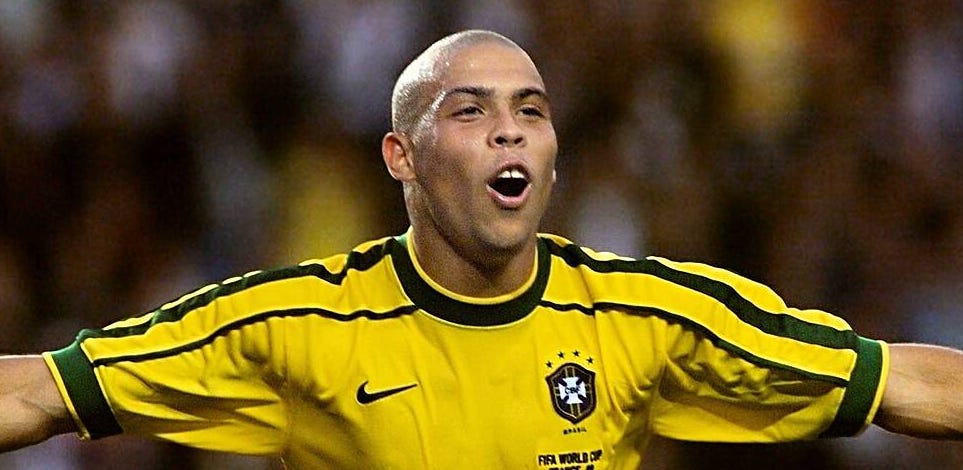The real reason why you should pass the ball to your Ronaldos
On team dynamics, favoritism and winning
Hello to the 3,362 subscribers who read Consulting Intel!
Even at my advanced age, I still enjoy playing football in a local competition.
Not American football (the pads-and-helmet type), I am talking about real football: the kind you play with your feet, the kind where you feel the ball as an extension of your body, the kind that makes grown men weep with joy or despair after 90 minutes of sweating and swearing.
If you have ever played the game, really played, week after week, rain or shine, with people you know well, you understand something the modern corporate world seems hell-bent on forgetting.
Not everyone is the same.
Let’s imagine you are the #10, the playmaker, the creative engine of the team, that magical role that sits behind the striker, linking midfield to attack, the one who sees the whole pitch, the one with the vision, the one who makes the final pass before the goal.
Maradona was a #10. So was Riquelme, or Totti, Del Piero, Zidane, Rui Costa. So is Messi, in a way. It is a role that carries weight and expectation.
You are driving forward with the ball.
The defence is scrambling. Two teammates are running into space.
One is Ronaldo Il Fenomeno, the original, the Brazilian who made defenders look like traffic cones (we spoke about him here as well). The other… is me, a decent enough player who trains hard and shows up every week, but does not have Ronaldo’s feet. Or his instinct. Or his ruthlessness in front of goal.
So, you tell me: all things being equal, do you pass the ball to me or to Ronaldo?
You pass it to Ronaldo. Every time. Without hesitation. In football, we call this a high probability decision.
If you pass to me, you are either mad or engaging in some perverse form of equality theatre. That moment, that split second when you decide who gets the ball, is not just about football. It is a perfect metaphor for how we should think about work, teams, leadership and outcomes.
The lie of equality
Somewhere along the way, modern organizations, especially the well-meaning HR-heavy ones, began to sell a fantasy, a kind of utopian flatness, where everyone has equal potential and equal value.
I call bullshit.
I have worked with incredible professionals. Closers. Artists. Operators who seem to conjure results out of thin air. And I have also worked with people who, despite their best intentions and high EQs, simply do not deliver when it matters.
They are not bad people. They are not lazy. But they are not Ronaldo.
When you have a critical opportunity (I don’t know, for example a high-stakes project, a make-or-break client meeting, a closing window for action, etc) you must give the ball to your Ronaldo.
Not because it is fair. Not because it is democratic. But because you are trying to win!!
Let me be clear: this is not a call for arrogance or cruelty. We should always lead with decency and most definitely I do not believe in humiliating people or making them feel like pawns.
I also do not believe in pretending.
I do not believe in putting someone into a position they cannot handle just to make them feel included. That is not kindness. That is sabotage. You set them up to fail, and you damage the team in the process.
There is this popular startup slogan: “A-players hire A-players; B-players hire C-players” that sounds catchy and even smells like wisdom, but it is misleading in two important ways.
First, you never really know who someone is until you have worked with them, under stress, on something that matters. Interviews are theatre. Resumes are marketing brochures. Real work is a warzone.
Second, A-players are not a monolith. You have A+, A, A- and A---. You have specialists and generalists, stars and enablers, you have the ones who win the game and the ones who make space for the winners. The idea that “A-player” is a fixed identity is as naïve as thinking all forwards can play midfield.
I will tell you what you should really do.
You build your own mental stack ranking. Quietly, honestly, without broadcasting it, you observe.
Who closes? Who finishes? Who shows up under pressure? Who plays safe and defers? Who steps up when you are drowning?
And then you make your decisions accordingly.
Maximize the individual to maximize the team
A great team outcome is not the sum of each part, but the result of strategic amplification, like a conductor pulling more out of a soloist when the moment calls for it, then pulling back the tempo to let others catch up.
🚨 Get 10% OFF LEADERTOOLS using the Consulting Intel discount!
The Leaders Toolkit is a deck of 52 tools, frameworks and mental models to make you a better leader. Each card is highly actionable with zero fluff or jargon.
These tools are used by people working at some of the best run companies in the world such as Amazon, Hubspot and Google. Grab your Leader’s Toolkit at LeaderTools.co
Use code CONSULTANT10 for 10% off.
You do not win by flattening your team but you win by knowing who to pass the ball to.
That means yes, you need favorites (and no, that does not make you an asshole but simply someone who is paying attention).
Let your top performers lead, give them air, space, accountability and a stage. Then, with care and patience, help everyone else find the zone where they can be great, even if that zone is initially smaller, even if it is behind the scenes and even if it means they never get the final shot.
I have seen it in football.
I have seen it in client work.
I have seen it in startups and in corporate restructures.
The leaders who win are the ones who know how to allocate the ball based on likelihood of success.
Look, fairness is a luxury: you aim for it when the stakes are low.
When your back is against the wall, when the client is about to walk, or you are bleeding cash, or you have three weeks to deliver what should take three months, you need clarity.
You need someone who can take the damn shot and score.
You do not need a democracy.
You need Ronaldo. Or Michael Jordan. Or whoever the strongest guy you have is.
Let us stop pretending: you know who your best players are.
You know who you trust when it matters, and you know who you pass the ball to when everything is on the line.
Have the courage to act on that knowledge, and help everyone else find a position where they can contribute meaningfully, without fantasizing they are strikers when they are not.
In business there should not be participation trophies.
There is only the goal, the net, and the scoreboard.
(Ohhhhh did I ruffle anyone’s feathers with this one?!)
Ciao, until next time! 👋
✍ The Management Consultant
PS: If you like this newsletter, I have one huge favor to ask.
Share it around with friends, family and colleagues.
This is the most effective way to support me (…and to keep me motivated to continue writing 😁).
Thank you 👇👇👇
🎯 INTERESTING SH*T
A couple of things I found on the internet that you may like…
I don’t know if this website is even legal, but hey it seems so well stocked!!
If you tell companies what to do and then disappear, you are a con-sultant not a consultant: an interesting read on Nike’s recent misfortunes
👀 JOIN THE DISCORD SERVER
If you like this newsletter, you will love our Discord Server.
In there, you will find a tight-knit community of 190+ management consultants from all over the world discussing real-life challenges, giving each other support and recommending the good stuff to keep our knowledge top notch.







I really really this write up. Brilliant!
Two comments. True as the English have it so beautifuly horses for courses. Plus just some is a 10 and can save the day doesn’t mean the rest are worthless. Any football player understands that, but its often forgotten in the corporate world. Next time I tell you where I work